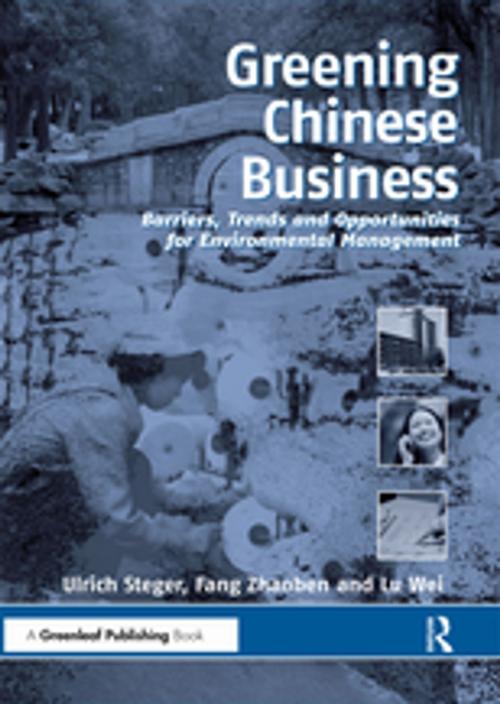Greening Chinese Business
Barriers, Trends and Opportunities for Environmental Management
Business & Finance, Business Reference, Business Ethics| Author: | Lu Wei, Fang Zhaoben, Ulrich Steger | ISBN: | 9781351281621 |
| Publisher: | Taylor and Francis | Publication: | September 18, 2017 |
| Imprint: | Routledge | Language: | English |
| Author: | Lu Wei, Fang Zhaoben, Ulrich Steger |
| ISBN: | 9781351281621 |
| Publisher: | Taylor and Francis |
| Publication: | September 18, 2017 |
| Imprint: | Routledge |
| Language: | English |
Environmental regulation in China is not really different from that in the rest of the world, except that environmental authorities are relatively new and less established. In order to understand why corporate environmental performance has hardly improved despite the existing regulatory framework, empirical research on high-level executives' perceptions of environmental protection is essential. This unique book analyses and interprets Chinese managers' perceptions of environmental management and regulatory enforcement practices in Chinese enterprises. Most importantly, it identifies the bottlenecks to environmental protection in Chinese firms. It includes a detailed analysis of the needs for management training (for example, CEO and executive development and MBA education) in China and presents a roadmap of how they can be met. Finally, it presents two case studies that illustrate how Chinese corporations currently react to a wide range of different environmental challenges, including hardening regulatory pressure, competition and lack of capital. Based on an innovative research project sponsored by the UNESCO/UNDP offices in Beijing and undertaken by the Institute for Management Development (IMD), Lausanne, Switzerland and the Business School of the Academy of Science and Technology (USTC), Hefei, China, Greening Chinese Business provides the first hard empirical evidence of how Chinese managers view environmental protection. Over 300 companies-both state-owned enterprises and SMEs-took part in the research. Key findings includeAround 70% of managers surveyed admit moderate or even heavy environmental impact (this is a subjective assessment without an external benchmark). Furthermore, they indicate that the lack of environmental performance is primarily due to insufficient managerial expertise, capital and employment-related protectionism. Managers hesitate to take necessary action to upgrade technical equipment, because, although decreasing pollution, upgrading would lead to lay-offs that, in turn, would diminish social stability. Since the latter is first priority in China, managers fear loss of their companies'-and, attached to that, their personal-image, which plays a very important role in Chinese culture. Regulative enforcement has been strong enough to put environmental management on the "to do" lists of Chinese managers. Nevertheless, managers criticise existing enforcement practices as being too lax and untransparent (due to local protectionism, bribery and lack of expertise in the enforcement institutions). Managers consider environmental functionaries-the Chinese equivalent of an environmental protection agency-and the government to be the most important environmental stakeholders. This is a clear sign for their predominantly reactive attitude towards environmental protection: few Chinese companies are going beyond compliance and pioneering integrated approaches to pollution prevention. The research shows similarities between current Chinese company approaches and the "state of the art" in industrial centres of OECD countries such as Germany in the 1960s. Apart from a lack of capital, managers cite a lack of expertise-managerial more than technical-as the main obstacle to "greening" their organisations. Environmental management programmes need to be developed: competence-building should start with CEOs and executives. Greening Chinese Business will aid readers to understand how: Chinese managers perceive and react to the increasing (more external than internal) pressure to improve environmental protection; understand the regulatory, public and business environment in which Chinese managers make decisions about environmental protection; understand the potential for improvement of this regulatory, public and business environment, either as a manager or an external stakeholder and develop strategies that lead to improved stakeholder relationships and, consequently, to competitive advantage; understand the urgent need to develop environmental management practices in Chinese companies in areas such as EMSs and supply chain management; and identify the resources available for management development in China.
Environmental regulation in China is not really different from that in the rest of the world, except that environmental authorities are relatively new and less established. In order to understand why corporate environmental performance has hardly improved despite the existing regulatory framework, empirical research on high-level executives' perceptions of environmental protection is essential. This unique book analyses and interprets Chinese managers' perceptions of environmental management and regulatory enforcement practices in Chinese enterprises. Most importantly, it identifies the bottlenecks to environmental protection in Chinese firms. It includes a detailed analysis of the needs for management training (for example, CEO and executive development and MBA education) in China and presents a roadmap of how they can be met. Finally, it presents two case studies that illustrate how Chinese corporations currently react to a wide range of different environmental challenges, including hardening regulatory pressure, competition and lack of capital. Based on an innovative research project sponsored by the UNESCO/UNDP offices in Beijing and undertaken by the Institute for Management Development (IMD), Lausanne, Switzerland and the Business School of the Academy of Science and Technology (USTC), Hefei, China, Greening Chinese Business provides the first hard empirical evidence of how Chinese managers view environmental protection. Over 300 companies-both state-owned enterprises and SMEs-took part in the research. Key findings includeAround 70% of managers surveyed admit moderate or even heavy environmental impact (this is a subjective assessment without an external benchmark). Furthermore, they indicate that the lack of environmental performance is primarily due to insufficient managerial expertise, capital and employment-related protectionism. Managers hesitate to take necessary action to upgrade technical equipment, because, although decreasing pollution, upgrading would lead to lay-offs that, in turn, would diminish social stability. Since the latter is first priority in China, managers fear loss of their companies'-and, attached to that, their personal-image, which plays a very important role in Chinese culture. Regulative enforcement has been strong enough to put environmental management on the "to do" lists of Chinese managers. Nevertheless, managers criticise existing enforcement practices as being too lax and untransparent (due to local protectionism, bribery and lack of expertise in the enforcement institutions). Managers consider environmental functionaries-the Chinese equivalent of an environmental protection agency-and the government to be the most important environmental stakeholders. This is a clear sign for their predominantly reactive attitude towards environmental protection: few Chinese companies are going beyond compliance and pioneering integrated approaches to pollution prevention. The research shows similarities between current Chinese company approaches and the "state of the art" in industrial centres of OECD countries such as Germany in the 1960s. Apart from a lack of capital, managers cite a lack of expertise-managerial more than technical-as the main obstacle to "greening" their organisations. Environmental management programmes need to be developed: competence-building should start with CEOs and executives. Greening Chinese Business will aid readers to understand how: Chinese managers perceive and react to the increasing (more external than internal) pressure to improve environmental protection; understand the regulatory, public and business environment in which Chinese managers make decisions about environmental protection; understand the potential for improvement of this regulatory, public and business environment, either as a manager or an external stakeholder and develop strategies that lead to improved stakeholder relationships and, consequently, to competitive advantage; understand the urgent need to develop environmental management practices in Chinese companies in areas such as EMSs and supply chain management; and identify the resources available for management development in China.















